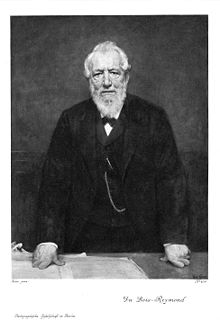Ignoramus et ignorabimus
Ignoramus et ignorabimus (Latin: "We do not know and we will never know") is a saying of the physiologist Emil Heinrich Du Bois-Reymond , who has become known as an expression of skepticism towards the explanatory claims of the natural sciences . The full quote reads:
“When faced with the riddles of the physical world, the natural scientist has long been used to uttering his 'ignoramus' with male renunciation. Looking back on the victorious course he has traversed, he is supported by the silent awareness that where he does not know now, at least under certain circumstances he could know, and one day perhaps will. In contrast to the riddle of what matter and force are, and how they are able to think, he has to make up his mind once and for all to the much more difficult proposition: 'Ignorabimus'. "
Du Bois-Reymond uttered the words for the first time in 1872 in the lecture "On the limits of nature knowledge", which he gave at the meeting of the Society of German Natural Scientists and Doctors (GDNÄ) in Leipzig . Du Bois-Reymond postulates two fundamental limits of the knowledge of nature: On the one hand, the essence of matter and force is unknowable, on the other hand the relationship between the states of consciousness and their material conditions.
In his 1880 lecture "The Seven World Riddles " given to the Royal Academy of Sciences in Berlin , he differentiates - as the title suggests - a total of seven world riddles , some of which he considers fundamentally unsolvable. Du Bois-Reymond's theses attracted a lot of attention and were very controversial. Ernst Haeckel's most successful book “ Die Weltträthsel ”, for example, is a reaction to the Theses du Bois-Reymonds.
The Göttingen mathematician David Hilbert countered with the words: "We have to know. We will know."
Even today in philosophy of mind - and especially in the quality debate - there are numerous reactions to the Ignoramus-et-ignorabimus speech, as du Bois-Reymond considered consciousness to be fundamentally inexplicable. He claimed:
“What conceivable connection exists between certain movements of certain atoms in my brain, on the one hand, and, on the other hand, the original, indefinable, indisputable facts, 'I feel pain, feel pleasure; I taste sweets, smell the scent of roses, hear the sound of the organ, see Roth ... '"
More recently, Peter Bieri and Hans Flohr , for example, have commented on this attitude - the first approving, the second disapproving.
literature
- Emil du Bois-Reymond: Beyond the Limits of Knowledge of Nature. 1872, reprint a. a. in: Emil du Bois-Reymond: Lectures on philosophy and society. Meiner, Hamburg 1974
- Emil du Bois-Reymond: The seven world riddles , 1880, reprint u. a. in: Emil du Bois-Reymond: Lectures on philosophy and society. My Hamburg 1974
- Kurt Bayertz , Myriam Gerhard, Walter Jaeschke (eds.): The Ignorabimus dispute. Vol. 3 Weltanschauung, philosophy and natural science in the 19th century. Meiner, Hamburg 2007, ISBN 978-3-7873-2158-2 .
- Myriam Gerhard: Du Bois-Reymonds Ignorabimus as a natural-philosophical shibboleth . In: Kurt Bayertz, Myriam Gerhard, Walter Jaeschke (eds.): The Ignorabimus dispute. Vol. 3 Weltanschauung, philosophy and natural science in the 19th century. Meiner, Hamburg 2007, ISBN 978-3-7873-2158-2 , pp. 241-252
Web links
- Beyond the limits of the knowledge of nature , Leipzig: Veit & Comp. 1872 (first edition) digitized and full text in the German text archive
- About the limits of nature recognition (Ed. From 1912: Speeches by Emil du Bois-Reymond in two volumes. First volume. 2nd complete edition, edited by Estelle du Bois-Reymond, 441–473. Leipzig: Veit & Comp.) Digitized
- The seven world riddles digitized
